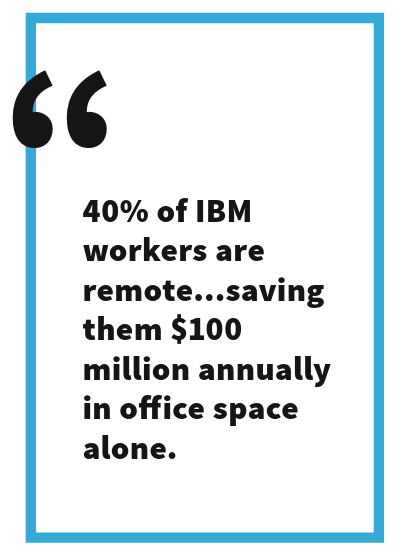 All team members at VirtualPBX work remotely at least part-time, and many of us have amassed several decades of work-from-home experience. Our new e-book about remote team management compresses those years of knowledge into a handful of helpful chapters that can be useful to your whole team.
All team members at VirtualPBX work remotely at least part-time, and many of us have amassed several decades of work-from-home experience. Our new e-book about remote team management compresses those years of knowledge into a handful of helpful chapters that can be useful to your whole team.
Today we have launched Chapter 1 of Managing Remote Teams – the first in a series that will be offered on our website in the coming weeks. The first chapter discusses the history of remote work and the benefits for businesses that choose full- or part-time remote work environments.
Why Go Remote?
In large part, companies will want to pursue remote work because it can save them money and because it’s accessible. Both those attributes work hand-in-hand to give businesses incentive to let their employees work from home.
 There’s a historical precedent to remote work. Did you know that IBM had a large percentage of its workforce working remotely in 2009 and that, during that time, it saved hundreds of millions of dollars annually?
There’s a historical precedent to remote work. Did you know that IBM had a large percentage of its workforce working remotely in 2009 and that, during that time, it saved hundreds of millions of dollars annually?
Your own remote team management doesn’t have to mirror IBM’s style. Yet you can take heart that other companies have paved the way and done so with lesser conditions than modern tech now provides everyone.
Benefits of Modern Tech
Since that time, broadband internet access has become more commonplace, and new gadgets like smartphones have taken over the consumer and business landscape. Think about the last time you went without your phone. It has become a part of your life, and your mobility as a worker has improved because of it.
Increased access to digital technologies support what IBM was pioneering in the previous decade. Now any business, large and small, has the ability to go remote because the tools necessary to do so are widespread.
Better Work-Life Balance
Remote work also helps your employees live more fulfilling lives.
 Studies show that employees who have the freedom to work remotely are substantially happier with their jobs and their lives overall.
Studies show that employees who have the freedom to work remotely are substantially happier with their jobs and their lives overall.
On-the-job performance may also increase when you allow individuals to work from home. Employees often are able to concentrate better and find atmospheres to work that are less distracting and more conducive to completing daily tasks. In this way, remote team management is improved automatically by simply allowing for the change in workspaces.
Bolster Your Remote Team Management
The first key to managing a remote team well is knowing how the history of remote work has taken shape. It pays to be knowledgeable about the ways in which your own company can benefit from remote work’s past.
Our e-book expands on these topics to give you a deeper sense of how work-from-home situations have evolved over the past decade. Within only a few pages, we hope to show you that remote team management can be simpler than you expect and that, no matter your industry or company size, your business, and your employees can benefit from remote work.
Download our e-book today for a quick, convincing read that can get you started in thinking about the switch to a work-from-home culture.







